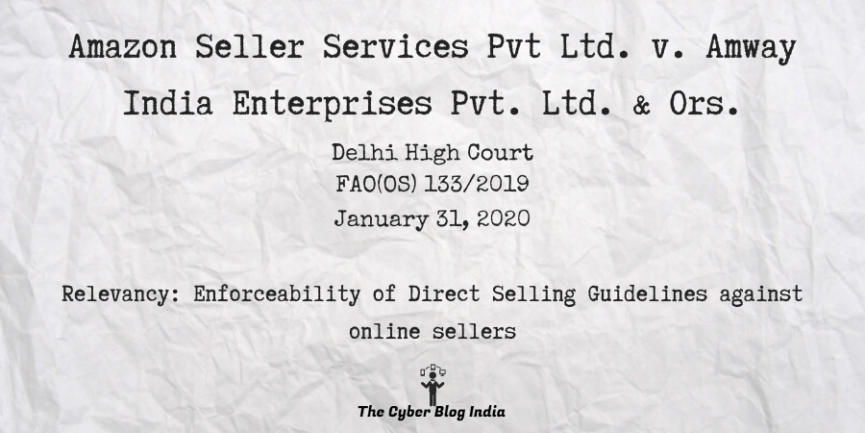Amazon Seller Services Pvt. Ltd. v. Amway India Enterprises Pvt. Ltd. & Ors.

Amazon Seller Services Pvt Ltd. v. Amway India Enterprises Pvt. Ltd. & Ors.
In the High Court of Delhi
FAO(OS) 133/2019
Before Justice Talwant Singh and Justice S. Muralidhar
Decided on January 31, 2020
Relevancy of the case: Enforceability of Direct Selling Guidelines against online sellers.
Statutes & Provisions Involved
- The Information Technology Act, 2000 (Section 2(w), 79)
- The Constitution of India, 1950 (Article 13, 19(1)(g), 73, 77)
Relevant Facts of the Case
- Six appeals have been filed in the present case – three appeals from Amazon against Amway, Oriflame and Modicare Ltd. respectively; two appeals from Cloudtail against Amway and Oriflame respectively and the sixth appeal from Snapdeal Private Ltd. against Amway.
- All these have been filed to challenge the judgment which injuncted the Appellants from selling the goods of the respondents who claimed to be Direct Selling Entities (DSEs) according to the Direct Selling Guidelines (DSGs), on the Appellants e-commerce platforms.
- Amway is engaged in the manufacturing and distribution business through a model called the Direct Selling Business Model (DSBM) in which Indian customers own and operate their own business by enrolling themselves as direct sellers.
- According to Amway’s Code of Ethics, all products are marked with a declaration that they can only be sold by Amway Business Owners (ABOs).
- Hence, an interim injunction restraining Amazon to sell Amway’s products was made. Meanwhile, the Additional Solicitor General of India submitted that DSGs “have to be followed though they are advisory in nature” and have binding effect under Article 77 of the Constitution.
- Thus, it was concluded by the Judge that the DSGs were binding in nature as “they did not infringe any fundamental rights of either the sellers or the platforms”.
- The present appeals were then filed by Amazon, Cloudtail and Snapdeal challenging the impugned judgment.
Prominent Arguments by the Advocates
- Mr Saikrishna Rajgopal, for the Appellants: The DSGs is not a law under Article 13 of the Constitution as they infringe upon the Fundamental Rights guaranteed by Art.19(1)(g) of the Constitution. The DSGs are mere guidelines which could not be characterised as ‘law’ and therefore, cannot regulate the exercise of the right to practice any profession or carry occupation, trade and business guaranteed by Art.19(1)(g) of the Constitution of India, 1950.
Opinion of the Bench
- The submission by the ASG on the nature of the DSGs can be ‘advisory’ and not ‘evidence’.
- It was crucially overlooked in the impugned judgment that the DSGs were not in the form of ‘executive instructions’ at all.
- Merely because the DSGs are notified in the Gazette, they do not attain the status of “law” within the meaning of Article 13 of the Constitution. The source to frame such guidelines is traceable only to the Consumer Protection Act, 2019 (CPA). With the CPA, 2019 itself not having been notified, these draft guidelines could not have attained the character of “binding rules”. Hence, they could not be sourced to either Article 73 or 77 of the Constitution.
- Clause 7(6) of the DSGs imposes a restriction on the buyer that he/she can’t resell the product online. Such a condition is not an enforceable law vis-à-vis the third party, and though it were considered to be binding, the contract was between Amway and the ABO which suggests that Amway can only proceed against the ABO for breach of such condition and not the online platforms.
- Guidelines can’t be invoked to injunct online sellers against the sale of products of Amway, Oriflame, etc. merely because they have their channels of online sale.
Final Decision
- The impugned judgment is set aside stating that DSGs are not enforceable against online sellers.
- The interim injunctions stand dismissed.
- The respective respondents are ordered to pay Rs. 50,000 to the corresponding Appellants within four weeks from the judgment.
इस केस के सारांश को हिंदी में पढ़ने के लिए यहाँ क्लिक करें | To read this case summary in Hindi, click here.
